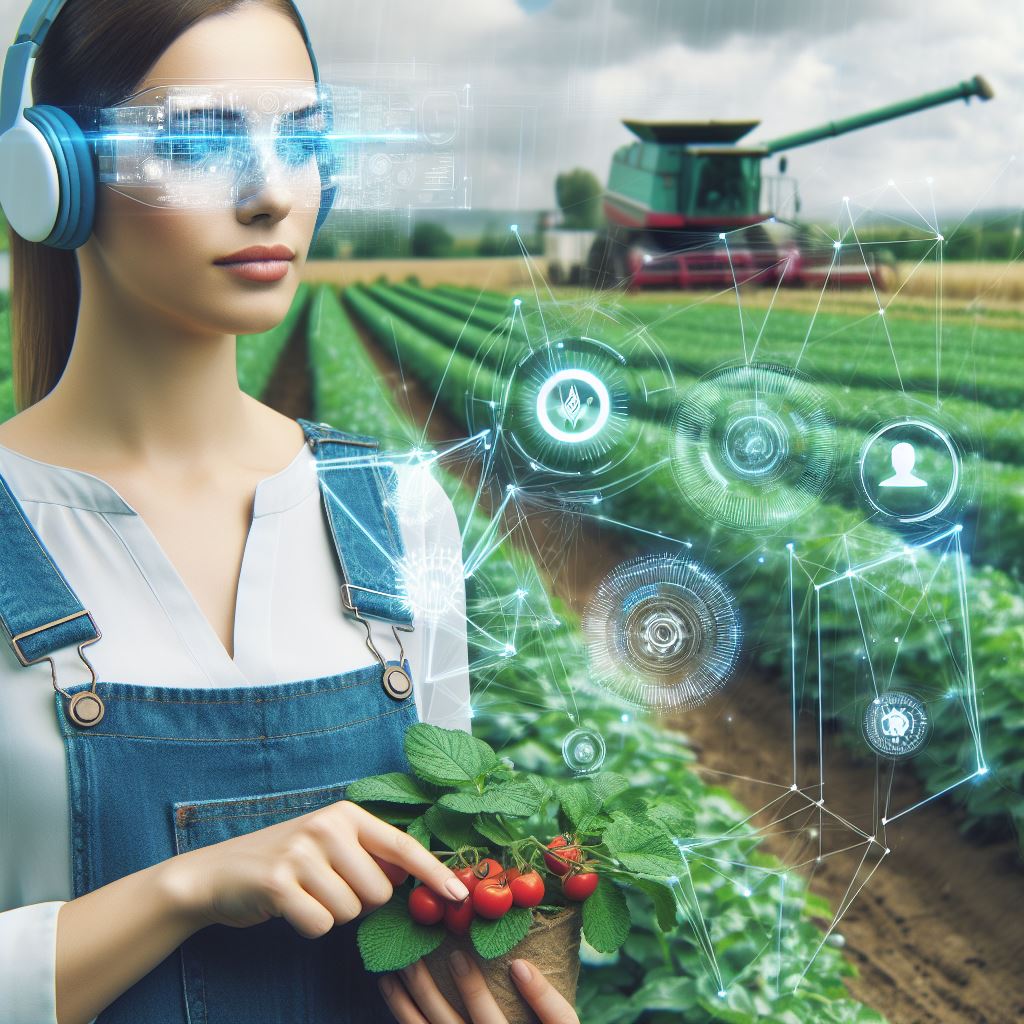Introduction
Let’s explore AI in Agriculture Supply Chains.
Define AI in agriculture
AI in agriculture refers to the application of artificial intelligence technology in the agricultural sector.
Supply chains play a crucial role in agriculture as they ensure the smooth flow of products from farm to market.
AI can streamline supply chains by automating processes, optimizing logistics, and improving decision-making.
The importance of supply chains in agriculture
Supply chains in agriculture involve numerous steps, from production to distribution, storage, and consumption.
These chains are responsible for connecting farmers, suppliers, processors, distributors, retailers, and consumers.
Seamless supply chains are essential for ensuring that agricultural products reach the market efficiently and in a timely manner.
Briefly mention how AI can help streamline supply chains
AI technology can assist in streamlining these supply chains by leveraging various capabilities.
For instance, machine learning algorithms can analyze data on weather, soil conditions, and crop yield to provide farmers with precise insights for better decision-making.
This allows them to optimize irrigation, fertilizer application, and pest control, leading to higher productivity and reduced waste.
Additionally, AI-based solutions can automate repetitive tasks, such as sorting and grading produce, improving operational efficiency and reducing labor costs.
Intelligent robots can be employed to handle tasks like harvesting, packaging, and warehouse management, further enhancing the efficiency of the supply chain.
Furthermore, AI can optimize logistics by analyzing real-time data on transportation routes, predicting demand, and managing inventory.
This enables farmers and distributors to plan and execute deliveries more effectively, reducing transportation costs and minimizing delays.
In general, AI technology has the potential to revolutionize the agricultural industry by streamlining supply chains.
Transform Your Agribusiness
Unlock your farm's potential with expert advice tailored to your needs. Get actionable steps that drive real results.
Get StartedBy automating processes, optimizing logistics, and improving decision-making, AI can help farmers and stakeholders in the agricultural sector enhance productivity, reduce costs, and ensure the timely delivery of high-quality products to the market.
Role of AI in Supply Chains
Artificial Intelligence (AI) is revolutionizing the agricultural industry by streamlining supply chains and optimizing various processes.
With the help of AI, farming and food production can become more efficient, sustainable, and profitable.
The Role of AI in Optimizing Supply Chain Processes
AI plays a crucial role in optimizing supply chain processes by providing real-time data analysis, predictive analytics, and automation.
- Real-time data analysis: AI algorithms can analyze vast amounts of data from different sources, including weather conditions, market trends, and customer preferences. This data analysis helps in making informed decisions and adjusting supply chain operations accordingly.
- Predictive analytics: AI can predict demand patterns and market trends using advanced algorithms and machine learning. By analyzing historical data and current market conditions, AI enables businesses to forecast future demand accurately. This helps in avoiding inventory shortages or excesses and ensures optimum resource allocation.
- Automation: AI-powered automation helps in reducing manual efforts and errors in supply chain processes. Automation can include tasks like order processing, inventory tracking, and logistics management. AI algorithms can efficiently manage these tasks, leading to faster and more accurate operations.
How AI Improves Forecasting and Demand Planning
AI improves forecasting and demand planning by analyzing historical data, market trends, and customer behavior.
- Analyzing historical data: AI algorithms can analyze vast amounts of historical data to identify patterns and correlations. This analysis helps in understanding customer preferences, seasonal variations, and market dynamics, leading to more accurate demand forecasts.
- Monitoring market trends: AI can continuously monitor market trends, including price fluctuations, competitor strategies, and consumer preferences. By considering these factors, AI-powered systems can adjust demand forecasts and supply chain strategies accordingly.
- Customer behavior analysis: AI algorithms can analyze customer behavior, including online searches, purchase history, and social media interactions. This analysis provides valuable insights into customer preferences and enables businesses to personalize their offerings and enhance the accuracy of demand planning.
The Use of AI in Inventory Management and Logistics
AI has significant applications in inventory management and logistics, leading to improved efficiency and cost savings.
- Optimized inventory levels: AI algorithms can analyze demand patterns, production capacities, and lead times to optimize inventory levels. By maintaining optimal stock levels, businesses can minimize carrying costs while ensuring product availability.
- Efficient logistics management: AI-powered systems can optimize route planning, warehouse management, and transportation scheduling. By considering factors like traffic conditions, weather forecasts, and real-time demand, AI helps in reducing delivery lead times and optimizing resource utilization.
- Reduced supply chain disruptions: AI can proactively identify potential supply chain disruptions by monitoring various factors like weather events, political instability, and supplier performance. This early detection enables businesses to take preventive actions and minimize the impact of disruptions.
Basically, AI plays a crucial role in streamlining supply chains in agriculture.
By optimizing processes, improving forecasting, and enhancing inventory management and logistics, AI enables businesses to achieve operational excellence, cost savings, and customer satisfaction.
Embracing AI in the agricultural industry is essential for staying competitive and sustainable in the ever-evolving market.
Read: Agribusiness in Asia: New Market Insights
Benefits of AI in Agriculture Supply Chains
Artificial Intelligence (AI) has emerged as a game-changer in the agriculture industry, revolutionizing supply chains and streamlining operations.
By harnessing the power of AI, farmers and suppliers can experience a wide range of benefits that contribute to cost reduction, minimize waste and spoilage, and improve product quality and safety.
Cost Reduction through Improved Efficiency
- AI algorithms can analyze vast amounts of data, allowing farmers to optimize production and reduce overall costs.
- Through AI-powered predictive analytics, farmers can accurately forecast demand and adjust supply accordingly.
- Automated systems driven by AI can enhance operational efficiency, reducing the need for manual labor and associated expenses.
- AI-powered drones and robots can perform tasks such as seeding, spraying, and harvesting faster and more accurately.
- By eliminating inefficiencies in the supply chain, AI helps farmers minimize financial losses and maximize profits.
Minimizing Waste and Spoilage
- AI systems can monitor and analyze environmental conditions, ensuring optimal storage and transportation conditions for perishable goods.
- Smart sensors integrated with AI technology can detect spoilage, enabling prompt action to prevent further damage.
- AI algorithms can optimize inventory management, reducing overstocking and preventing unnecessary wastage.
- AI-powered sorting and grading systems can identify defective products, preventing their inclusion in the supply chain.
- Real-time monitoring of crops and livestock health using AI helps farmers identify and address issues promptly, reducing losses.
Improving Product Quality and Safety
- AI-enabled imaging systems can precisely assess the quality and ripeness of agricultural products, ensuring consistent standards.
- AI algorithms can detect pathogens and contaminants in produce, enhancing food safety and reducing the risk of outbreaks.
- By optimizing irrigation and nutrient delivery through AI, farmers can improve crop quality and yield.
- AI-powered robots can perform precision harvesting, minimizing damage to crops and preserving overall product quality.
- AI-driven analytics can identify trends and patterns in consumer preferences, enabling the production of tailored products.
The benefits of integrating AI into agriculture supply chains are clear.
Not only does it lead to cost reduction through enhanced efficiency, but it also minimizes waste and spoilage while improving product quality and safety.
By leveraging AI, farmers can streamline their operations, make data-driven decisions, and stay competitive in an increasingly demanding market.
Generally, AI in agriculture is not just a buzzword.
It has the potential to transform the way we produce, process, and distribute food.
As technology continues to advance, it is vital for farmers and suppliers to embrace AI and harness its benefits for sustainable and efficient food production.
Read: Trade Policies’ Effect on US Farming Sector
Challenges and Limitations of AI in Agriculture
Potential challenges of implementing AI in existing supply chains
- Resistance from farmers and industry stakeholders due to skepticism towards new technologies.
- Cost of implementing AI systems and potential disruptions during the transition period.
- Inadequate infrastructure and lack of access to high-speed internet in rural areas.
- Complexity of integrating AI into existing agricultural processes and systems.
- Potential cybersecurity threats and data breaches that may compromise the supply chain.
Limitations in terms of data availability or accuracy
- Insufficient quality and quantity of agricultural data for training AI algorithms.
- Poor data management practices and lack of standardization across the industry.
- Challenges in accessing real-time data on weather conditions, crop health, and market demand.
- Inaccurate or incomplete data collected from sensors, drones, or other IoT devices.
- Data privacy concerns may limit the availability of personal or proprietary data.
Concerns regarding job displacement due to AI adoption
- Fear among agricultural workers about being replaced by AI-powered machines or robots.
- Potential loss of traditional jobs, especially for manual laborers in certain farming activities.
- The need for upskilling and reskilling the workforce to adapt to new roles and responsibilities.
- Ensuring equitable access to AI technologies and avoiding socioeconomic disparities.
- Addressing the perception that AI adoption may lead to a decline in human touch and personalized farming practices.
Ultimately, while AI has immense potential to streamline supply chains in agriculture, there are several challenges and limitations to consider.
Implementing AI may face resistance from farmers and stakeholders, incur costs, and require infrastructure improvements.
Additionally, the availability and accuracy of data can be limiting factors, hindering the effectiveness of AI systems.
Concerns about job displacement highlight the importance of retraining and ensuring fairness in the adoption of AI technologies.
By addressing these challenges and limitations, the agricultural industry can harness the power of AI to optimize supply chains and improve overall productivity and sustainability.
Showcase Your Farming Business
Publish your professional farming services profile on our blog for a one-time fee of $200 and reach a dedicated audience of farmers and agribusiness owners.
Publish Your ProfileRead: Global Farm Exports: Growth and Challenges

Real-Life Examples of AI in Agriculture Supply Chains
AI technology is increasingly being adopted in various industries, including agriculture, to streamline supply chains and enhance efficiency.
In this section, we will explore some real-life examples of companies and initiatives that have successfully implemented AI in their agriculture supply chain management practices.
We will discuss the specific AI technologies employed in these examples and highlight the outcomes and benefits achieved through their implementation.
Provide examples of companies or initiatives utilizing AI in supply chain management
One company at the forefront of AI in agriculture is Blue River Technology, which uses computer vision and machine learning algorithms to enable precision farming.
Their robot called “See & Spray” can automatically detect and precisely apply herbicides to weeds, reducing the need for manual labor and minimizing herbicide usage.
This technology has resulted in increased crop yields and decreased costs for farmers.
Abundant Robotics has developed an AI-powered robotic apple picker that uses computer vision to detect and harvest ripe fruit.
The robot’s algorithms identify which apples are ready for picking and gently plucks them, avoiding damage.
This technology reduces the labor-intensive process of manual harvesting and improves the overall efficiency and accuracy of fruit sorting.
Farmers Business Network (FBN) utilizes AI and machine learning algorithms to analyze vast amounts of agricultural data, including weather patterns, soil conditions, and crop performance.
By processing this data, FBN provides farmers with predictive analytics and recommendations on optimal planting and harvesting times, leading to improved crop yields and profitability.
AGCO, a leading agriculture machinery manufacturer, incorporates AI technologies into their machines to enable autonomous operations.
Their Fendt Xaver, an autonomous field robot, uses AI algorithms and sensors to navigate through fields, plant crops, and remove weeds.
This eliminates the need for human operators, reduces labor costs, and enables precision farming practices.
Companies like The Climate Corporation leverage AI and drone technologies to monitor and assess crop health.
Drones equipped with cameras and sensors capture high-resolution images of fields, which are then analyzed using AI algorithms.
The analysis provides insights into crop growth rates, pest infestations, and nutrient deficiencies, allowing farmers to take timely corrective actions and optimize crop yields.
Discuss the specific AI technologies employed in these examples
AI technologies are revolutionizing agriculture supply chains, enhancing efficiency and productivity in various ways.
- Predictive Analytics: AI algorithms analyze data to predict crop yields, optimize planting schedules, and manage inventory.
- Computer Vision: AI-powered cameras and drones monitor crop health, detect pests and diseases, and assess plant maturity.
- Autonomous Vehicles: AI enables driverless tractors and drones for planting, spraying pesticides, and harvesting, reducing labor costs.
- Robotics: AI-driven robots handle tasks like weeding, sorting, and packing produce, improving accuracy and efficiency.
- Smart Sensors: AI-equipped sensors monitor soil moisture, temperature, and nutrient levels, enabling precise irrigation and fertilization.
- Supply Chain Optimization: AI algorithms optimize logistics, reducing transportation costs and minimizing waste through predictive analytics.
- Market Forecasting: AI analyzes market trends, weather data, and consumer behavior to optimize pricing and distribution strategies.
- Crop Management Systems: AI platforms integrate data from various sources to provide real-time insights for crop management decisions.
These examples showcase the diverse applications of AI in agriculture supply chains, revolutionizing the industry’s efficiency and sustainability.
Highlight the outcomes and benefits achieved through AI implementation
These examples demonstrate the broad range of AI technologies employed in agriculture supply chain management, each addressing specific challenges and providing unique benefits. By integrating AI into their operations, companies and initiatives have achieved significant outcomes:
- Increased productivity: AI-driven machines and robots streamline tasks, reducing time and labor required for various activities, such as harvesting, weed control, and fruit sorting.
- Cost savings: By automating processes and reducing manual labor, farmers can cut labor expenses and improve overall operational efficiency, resulting in cost savings.
- Enhanced quality and accuracy: AI technologies enable precise monitoring, assessment, and decision-making based on real-time data, leading to improved crop quality and accurate resource allocation.
- Improved sustainability: AI-powered solutions optimize resource utilization, minimizing waste and environmental impact. Precision farming practices also reduce the need for excessive pesticide and herbicide usage.
Essentially, AI-driven advancements in agriculture supply chain management offer immense potential for boosting productivity, reducing costs, and optimizing resource utilization.
Real-life examples demonstrate the successful implementation of AI technologies in various aspects of agricultural operations.
By embracing AI, companies and initiatives in the agriculture industry can leverage these technologies to streamline their supply chains, enhance productivity, and achieve sustainable growth.
Read: Emerging Markets: Opportunities in Farming
Future Outlook of AI in Agriculture Supply Chains
AI has emerged as a game-changer in the agriculture sector, streamlining supply chains and driving efficiency.
With the potential for exponential growth, AI is set to revolutionize how the agriculture industry operates in the future.
Let’s take a closer look at the potential growth, emerging trends, and technologies, as well as the impact of AI on agriculture supply chains.
Potential Growth and Significance of AI in Agriculture
- AI offers immense opportunities for growth in the agriculture sector by optimizing supply chain processes.
- It enables farmers to make more informed decisions, leading to increased productivity and reduced costs.
- The use of AI in agriculture can lead to more sustainable farming practices and better resource management.
- With AI-powered automation, agriculture supply chains can become more efficient, reliable, and resilient.
- The market value of AI in agriculture is projected to reach billions of dollars in the coming years.
Emerging Trends and Technologies in AI for Agriculture
- Machine learning algorithms are being used to analyze vast amounts of agricultural data and generate valuable insights.
- Robotic systems and drones equipped with AI capabilities are revolutionizing farming operations.
- Remote sensing technologies combined with AI can monitor crop health and detect potential issues.
- AI-powered smart irrigation systems can optimize water usage and reduce water wastage.
- Computer vision technology allows for the automated detection of crop diseases and pests.
Potential Impact of AI on the Future of Agriculture Supply Chains
- AI-enabled predictive analytics can help optimize inventory management and reduce waste in the supply chain.
- By analyzing weather patterns and market demand, AI can assist in accurate crop planning and forecasting.
- AI can improve logistics and transportation efficiency, ensuring timely delivery of agricultural products.
- Automated sorting and grading systems equipped with AI technology can enhance product quality and consistency.
- AI-powered traceability systems enable better tracking of food products, ensuring food safety and quality.
Overall, AI holds immense potential for the future of agriculture supply chains.
By leveraging emerging technologies and trends, AI can drive growth, increase productivity, and promote sustainability in the agriculture sector.
As AI continues to evolve, its impact on supply chains is expected to transform the way farmers cultivate and distribute their produce.
With AI as a powerful ally, the future of agriculture is ripe with possibilities.
Conclusion
The use of AI in agriculture has the potential to revolutionize supply chains.
By utilizing advanced technologies such as machine learning and robotics, AI can greatly streamline and optimize various processes involved in the production and distribution of agricultural products.
Throughout this blog post, we have highlighted several key points.
Firstly, AI can help in predicting market demands and optimizing inventory management, ensuring that farmers have the right products at the right time, reducing wastage and increasing profitability.
Additionally, AI-powered drones and robots can assist in automating tasks like harvesting and sorting, improving efficiency and reducing labor costs.
The role of AI in streamlining supply chains cannot be underestimated.
It enables real-time monitoring of crops, soil conditions, and weather patterns, helping farmers to make informed decisions and implement timely interventions.
This not only improves productivity but also enhances sustainability by minimizing the use of resources such as water, fertilizers, and pesticides.
Showcase Your Farming Business
Publish your professional farming services profile on our blog for a one-time fee of $200 and reach a dedicated audience of farmers and agribusiness owners.
Publish Your ProfileHowever, while AI presents immense opportunities, it also comes with challenges.
One of the main concerns is the requirement of comprehensive data sets to train AI models accurately.
Additionally, there are ethical and privacy considerations associated with farmers and agribusinesses sharing their data with AI systems.
Despite these challenges, the benefits of AI in agriculture supply chains are vast.
It can result in increased productivity, reduced costs, improved quality control, and greater sustainability.
Moreover, streamlining supply chains through AI can contribute to better food security, enabling the agricultural sector to efficiently respond to increasing global demand.
Therefore, AI has the potential to transform agriculture by revolutionizing supply chains, making them more efficient, sustainable, and profitable.
Embracing AI in agriculture should be seen as an opportunity for farmers and agribusinesses to stay competitive and ensure the future success of the industry.




